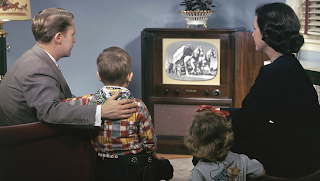The first television was created in 1884, as just an electromechanical device that produces monochrome images. However, September 7th, 1927 really indicates the birth of television, as 21-year-old Philo Farnsworth created the first electronic television. Farnsworth's development allowed for images to be scanned by electrons, which captured images through radio frequencies that would transmit the image back on to a TV screen.
The first broadcast came just a few months later on January 13th, 1928 in Schenectady, NY. Local General Electric workers broadcasted rotating images of a Felix the Cat doll for hours to test the equipment. This station later became WNBC, which eventually grew into an entire network.
In the 1930's, RCA, a dominant radio business that also owned WNBC, invested $50 million in developing electronic television. They ended the decade with televising both the World's Fair and a Princeton-Columbia baseball game, and with a license on Farnsworth's patent, began to sell 5x12 televisions that were known as "the tube."
In the 1940's, less than one percent of households owned a television. World War II forced a focus in manufacturing weapons rather than televisions. They cost about $400 at the time, which was worth the average two months' salary in a household. However, the technology soon improved and TV's were sold at lower prices, and up to one-third of American households owned a television. Although the decade was slow for television, it was important in creating the major networks that dominated both the screen and airwaves. The Columbia Broadcasting System (later known as CBS) began airing daily news reports. When the Supreme Court forced RCA to get rid of one of their networks, the one they lost eventually grew into the American Broadcasting Company (ABC) as they kept the National Broadcasting Company (NBC).
During the 50's and 60's, three national networks were the most often viewed in the United States: ABC, CBS, and NBC. Each day, families traditionally gathered around to watch the nightly news as well as that day's programming. Tens of millions of people tuned in to watch the shows and movies that aired on television, which expanded into nightly talk shows and game shows as well. These shows were funded through the radio profits of the networks, though television quickly became profitable as well. A sense of unity was brought together in both the household and across the country, as Americans would all be connected through these same shows that ushered in the "Golden Age" of television. Moments such as Walter Cronkite's report on the JFK Assassination, The Beatles appearing on The Ed Sullivan Show, and the moon landing were all moments that were shared with all of America.
In addition, television had a pivotal role in shaping American politics. The 1960 Presidential election debates were the first to be aired on television, and viewers noted an old and sweaty Richard Nixon struggling against a young and handsome John F Kennedy. In addition, footage of the Vietnam War was instrumental in swaying public sentiment against it, with the government not taking too kindly to CBS in particular.
In 1967, the Public Broadcasting System (PBS) was founded after it was recommended that a nonprofit station be included to challenge the other three networks in terms of news and education. Rather than advertising dollars, PBS relies on public donations, government funding, and corporate underwriters.
However, the rise of cable television in the 1980's brought new programming fixated on one subject, which included MTV, ESPN, and CNN. And with households now owning more than one television, families could watch what they wanted at any time. This rise in new networks and programming has sort of unglued the binding power that existed when television was dominated by those three main networks.
Along with a change in programming selections, coverage of news had been largely swayed in the 1990's. CNN innovated in its Gulf War on-the-ground coverage that updated Americans in real time, and was even used by the government to keep up with events. In an attempt to challenge cable as well, a lot of tabloid shows and talk shows emerged to attempt to sway viewers. This was all started by the sensationalism of the OJ Simpson trial.
Innovation was also introduced for television during this period. During the 80's, cassette players allowed for people to record and re-watch shows, and video games were also transformed by the use of television. In addition, high definition television, or HDTV, was introduced to allow clearer, high resolution images. However, televisions of the time could not pick up HDTV, which led to a massive transition from the old bulky TV sets to flat screens, which could also pick up digital transmissions.
Although televisions are less than a century old, it's hard to ever imagine a time where we didn't use them. Even with the internet taking hold as the new means of entertainment, television has always been the catalyst for innovation in both programming and news. Trends may change and viewing habits may differ, but television will forever be recognized as a piece of technology that transformed the world.
A family sitting down to watch television. The way we view TV today is far different from how it was in the '50's and '60's.
https://www.reference.com/history/year-did-first-television-come-out-c4ac5ddbb1390c53
https://junior.scholastic.com/issues/2018-19/012819/how-television-changed-america.html
https://www.nyu.edu/classes/stephens/History%20of%20Television%20page.htm




No comments:
Post a Comment